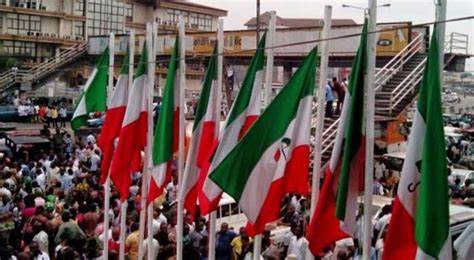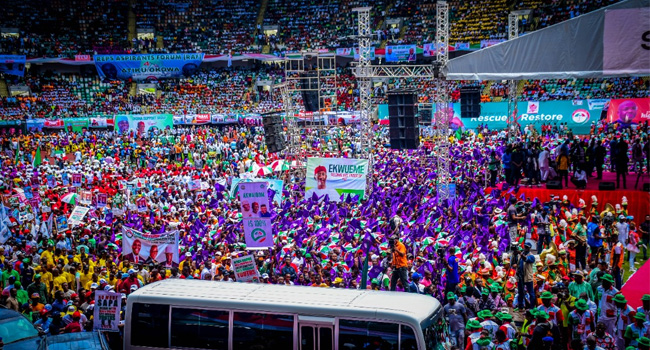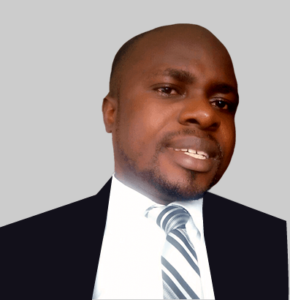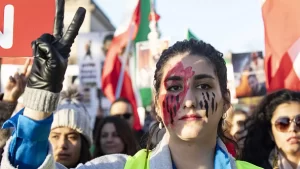How PDP’s Inability to Manage Internal Conflicts Led to Its Downfall
The Peoples Democratic Party (PDP), once the dominant political party in Nigeria, has been embroiled in internal crises for years. The recent suspension of key members and the resignation of the party’s National Chairman, Iyorchia Ayu, have further deepened the rifts within the party. Remember how the crises have not only weakened the PDP but also contributed to their loss in the just concluded presidential election to the All Progressives Congress (APC).

One major factor that has contributed to the PDP’s self-destruction is the failure of the party leadership to manage internal conflicts.The party has been plagued by infighting, with different factions vying for control and influence. The refusal of some members to abide by party rules and regulations, including zoning arrangements, has further exacerbated the situation. When key and influential members of the party were calling for the resignation of the party Chairman, it was critically a time to do a soul search.
Governor Nyesom Wike of Rivers State, a member of the PDP, has played a significant role in the party’s crises, some analysts have argued. Wike, a powerful and influential party stalwart, along with other members of the G-5, withdrew their support for the PDP presidential candidate Atiku Abubakar, arguing that the party ought to have looked towards the south for the next Nigerian leader since President Muhammadu Buhari is from the north(though a different party) and the zoning arrangement they have had within the party. Sources claimed, Wike supported Bola Tinubu, the candidate of the APC, who is now the president-elect.
As the saying goes, “better late than never,” but sometimes it can be too little too late. While it is commendable that the party is taking steps to discipline erring members, one cannot help but wonder if this action is coming too late to salvage the PDP’s reputation and unity. The PDP must learn from this experience and adopt measures to prevent a recurrence of similar crises in the future
Wike has also been vocal in his criticism of the PDP leadership, calling for the resignation of Iyorchia Ayu and accusing him of anti-party activities. While Wike’s criticisms may be valid, his approach to resolving the party’s crises has only served to deepen the rifts within the PDP. Unfortunately, the party leadership has also failed to toe the path of honesty and redemption as it appears they were ultimately sentenced for slfe-destruction!
One of the main features of the internal crises within the Peoples Democratic Party (PDP) is the suspension of some key members by the National Working Committee (NWC) for anti-party activities. Former Governor of Ekiti State, Ayodele Fayose, former Senate President, Pius Anyim, and others have been suspended for various reasons. The suspension of Benue State Governor, Samuel Ortom, and the subsequent referral to the national disciplinary committee of the party has also further deepened the rifts within the PDP. Governor Nyesom Wike of Rivers State has been vocal in his criticism of the suspensions which were earlier in the year slammed on them, declaring them null and void. However, the PDP leadership seems determined to discipline members who they believe have gone against the party’s constitution and rules. The inability of the party to manage these internal conflicts and reconcile with its members may continue to hamper its chances of success in future elections.
History is replete with similar cases across the world where self implosion has been the outright outcome. In Kenya, the Orange Democratic Movement (ODM) experienced a similar crisis in the lead-up to the 2017 presidential election. The party was divided over the decision to field Raila Odinga as its presidential candidate, with some members calling for a different candidate. This led to the formation of two factions (Orange Democratic Movement Party of Kenya and the Wiper Democratic Movement ) within the party, which ultimately weakened its chances of winning the election. The crisis was further exacerbated by the inability of the party leadership to address the underlying issues and prevent them from escalating.

To avoid a similar fate, political parties in other countries have adopted various strategies to manage internal conflicts. In the United States, for example, the Democratic Party has established internal conflict resolution mechanisms, such as the Democratic National Committee’s Unity Reform Commission, to address grievances and promote party unity.
In South Africa, the African National Congress (ANC) has adopted a consultative approach to resolving internal conflicts. The party’s National Executive Committee holds regular meetings to discuss contentious issues and reach consensus on the way forward. This has helped to maintain party unity and prevent the kind of internal strife that has plagued the PDP and led to its self-destruction.
As the saying goes, “united we stand, divided we fall.” The PDP’s inability to manage its internal conflicts has left it standing on shaky ground, and its self-destruction may serve as a cautionary tale for other political parties around the world. Just as a house divided against itself cannot stand, a political party torn apart by internal strife cannot hope to succeed in the long run. It is only through unity, cooperation, and a commitment to the greater good that political parties can hope to achieve their goals and serve the people they were created to represent. In the words of the wise, “better late than never,” but sometimes it can be too little too late. While it is commendable that the party is taking steps to discipline erring members, one cannot help but wonder if this action is coming too late to salvage the PDP’s reputation and unity. The PDP must learn from this experience and adopt measures to prevent a recurrence of similar crises in the future








